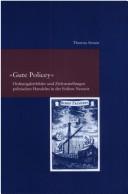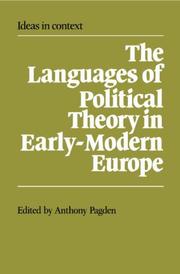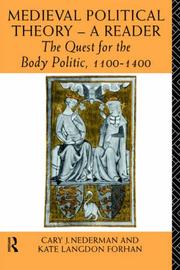| Listing 1 - 10 of 43 | << page >> |
Sort by
|

ISBN: 3486565338 3486707566 Year: 2001 Publisher: De Gruyter
Abstract | Keywords | Export | Availability | Bookmark
 Loading...
Loading...Choose an application
- Reference Manager
- EndNote
- RefWorks (Direct export to RefWorks)
""Definierbar"", so Friedrich Nietzsche, sei nur, ""was keine Geschichte hat."" Das Problem einer verbindlichen Definition von Liberalismus ist selbst das Ergebnis eines komplexen historischen Prozesses, in dem aus antiken Ursprüngen, aus liberalis und liberalitas, und aus vorpolitischen Bedeutungen schließlich der moderne Begriff Liberalismus entstand. Aber innerhalb des Umbruchs der altständischen Lebenswelt seit dem Ausgang des 18. Jahrhunderts bündelten sich in der Geschichte des neuartigen Deutungsmusters Liberalismus ganz unterschiedliche Erfahrungen und Erwartungen der Zeitgenossen. Ein
Liberalism -- Europe -- History. --- Liberalism. --- Political science -- Europe -- History. --- Liberalism --- Political science --- Law, Politics & Government --- Human Rights --- History --- History.
Book
ISBN: 0444411445 9780444411440 Year: 1973 Publisher: Amsterdam
Abstract | Keywords | Export | Availability | Bookmark
 Loading...
Loading...Choose an application
- Reference Manager
- EndNote
- RefWorks (Direct export to RefWorks)
Government --- Political parties --- Europe --- Coalition governments --- Political science --- Gouvernements de coalition --- Science politique --- History --- Histoire --- History. --- Coalition governments - Europe --- Political science - Europe - History
Book
ISBN: 0521200008 9780521200004 Year: 1973 Publisher: Cambridge University Press
Abstract | Keywords | Export | Availability | Bookmark
 Loading...
Loading...Choose an application
- Reference Manager
- EndNote
- RefWorks (Direct export to RefWorks)
Bodin, Jean --- Despotism --- Political science --- Despotisme --- Science politique --- History --- Histoire --- Bodin, Jean, --- Despotism. --- History. --- Political science - France - History --- Political science - Europe - History --- Bodin, Jean, - 1530-1596

ISBN: 3465033132 9783465033134 Year: 2004 Volume: 170 Publisher: Frankfurt am Main Klostermann
Abstract | Keywords | Export | Availability | Bookmark
 Loading...
Loading...Choose an application
- Reference Manager
- EndNote
- RefWorks (Direct export to RefWorks)
Political science --- History --- Europe --- Politics and government --- Economic policy --- History. --- Economic policy. --- Politics and government. --- Politics --- Political science - Europe - History --- Europe - Politics and government --- Europe - Economic policy

ISBN: 0521320879 9780521386661 9780521320870 9780511521447 0521386667 0511521448 Year: 1987 Publisher: Cambridge Cambridge University press
Abstract | Keywords | Export | Availability | Bookmark
 Loading...
Loading...Choose an application
- Reference Manager
- EndNote
- RefWorks (Direct export to RefWorks)
This volume studies the concept of a political 'language', of a discourse composed of shared vocabularies, idioms and rhetorical strategies, which has been widely influential on recent work in the history of political thought. The collection brings together a number of essays by a distinguished group of international scholars, on the four dominant languages in use in Europe between the end of the fourteenth and the beginning of the nineteenth century. They are: the language of political Aristotelianism and the natural law; the language of classical republicanism; the language of commerce and the commercial society; and the language of a science of politics. Each author has chosen a single aspect of his or her language, sometimes the work of a single author, in one case the history of a single team, and shown how it determined the shape and development of that language, and the extent to which each language was a response to the challenge of other modes of discourse.
Political philosophy. Social philosophy --- anno 1500-1799 --- Political science --- History --- History. --- Science politique --- Histoire --- Arts and Humanities --- Political science - Europe - History
Book
ISBN: 9782130590262 2130590268 Year: 2012 Volume: *3 Publisher: Paris Presses universitaires de France
Abstract | Keywords | Export | Availability | Bookmark
 Loading...
Loading...Choose an application
- Reference Manager
- EndNote
- RefWorks (Direct export to RefWorks)
Où en sont les droites en Europe ? C’est à cette question que ce livre propose d’apporter des réponses. À l’échelle de l’Union, l’effondrement du communisme et l’épuisement de la social-démocratie donnent le sentiment d’un triomphe des partis de droite, conservateurs ou libéraux. Pour autant, les difficultés de la gauche ne signifient pas que la droite dispose d’une doctrine capable de lui assurer une tranquille domination. À ce jour, la droite européenne n’a pas montré qu’elle avait de meilleures idées pour gouverner les nations. Elle présente simplement un profil philosophique, idéologique et culturel a priori plus en phase avec le monde qui s’impose : celui du marché, de l’entreprise, de l’État économe, des sociétés vieillissantes, de la préoccupation pour la sécurité… Mais la doctrine n’y est pas. La droite européenne atteint les limites de son pragmatisme. Confrontée à une situation inédite, la droite doit engager un profond travail de réflexion sur les effets que la nouvelle donne peut produire sur sa doctrine, son programme de gouvernement, son système d'alliance et son mode d'organisation, ses méthodes de production intellectuelle, ses outils de mobilisation électorale et militante. Si l’effondrement du communisme et l’épuisement de l’État providence ont fait exploser la gauche traditionnelle, la globalisation, la crise des finances et la concurrence des populistes peuvent dynamiter la droite traditionnelle. Une grande recomposition politique est en cours. Ce livre veut offrir au lecteur quelques clés pour en deviner les contours et en comprendre les enjeux.
Right and left (Political science) --- Political science --- Conservatism --- Droite et gauche (Science politique) --- Science politique --- Conservatisme --- History. --- Histoire --- Europe --- Politics and government . --- Politique et gouvernement --- History --- Politics and government --- Political science - Europe - History --- Conservatism - Europe - History --- Europe - Politics and government

ISBN: 0415064880 0415064899 9780415064897 9781315002927 9781136123481 9781136123566 9781136123641 9781138148024 Year: 1993 Publisher: London Routledge
Abstract | Keywords | Export | Availability | Bookmark
 Loading...
Loading...Choose an application
- Reference Manager
- EndNote
- RefWorks (Direct export to RefWorks)
Une introduction à la pensée politique du Moyen Age en Europe (de Bernard de Clairvaux à Christine de Pizan en passant par Dante, Saint-Thomas d'Aquin...).
History of Europe --- anno 1100-1199 --- anno 1200-1299 --- anno 1300-1399 --- Political science --- Philosophy, Medieval. --- Science politique --- Philosophie médiévale --- History. --- Early works to 1800 --- Histoire --- Ouvrages avant 1800 --- Philosophy, Medieval --- History --- 940.1 --- Geschiedenis van Europa: Middeleeuwen:--(ca.375-1492) --- #A9307W --- 940.1 Geschiedenis van Europa: Middeleeuwen:--(ca.375-1492) --- Philosophie médiévale --- Medieval philosophy --- Scholasticism --- Europe --- Political science - Europe - History. --- Political science - Early works to 1800. --- Political science - Europe - History --- Political science - Early works to 1800
Book
ISBN: 9780754678151 0754678156 9780754696087 0754696081 9781315589527 9781317113751 9781317113768 Year: 2009 Publisher: Farnham Ashgate
Abstract | Keywords | Export | Availability | Bookmark
 Loading...
Loading...Choose an application
- Reference Manager
- EndNote
- RefWorks (Direct export to RefWorks)
éd. rev. et augm. de l'édition française: Relations internationales: Une perspective européenne, Bruxelles: Editions de l'Université de Bruxelles, 2008.Don de l'auteur
International relations --- Political science --- Relations internationales --- Science politique --- Philosophy --- History. --- Study and teaching --- Philosophie --- Histoire --- Etude et enseignement --- Europe --- Foreign relations --- Relations extérieures --- European federation --- History --- #SBIB:327.1H10 --- -Political science --- -327.101 --- Administration --- Civil government --- Commonwealth, The --- Government --- Political theory --- Political thought --- Politics --- Science, Political --- Social sciences --- State, The --- Coexistence --- Foreign affairs --- Foreign policy --- Global governance --- Interdependence of nations --- International affairs --- Peaceful coexistence --- World order --- National security --- Sovereignty --- World politics --- Internationale betrekkingen: theorieën --- -History --- International relations. --- International relations - Philosophy - History. --- Political science. --- Political science - Europe - History. --- International Relations --- Law, Politics & Government --- Relations extérieures --- 327.101 --- Philosophy&delete& --- Histoire. --- International relations - Philosophy --- International relations - Philosophy - History --- Political science - Europe - History
Book
ISSN: 12594482 ISBN: 9782745333490 9782745334787 2745333496 Year: 2017 Volume: 195 Publisher: Paris Honoré Champion
Abstract | Keywords | Export | Availability | Bookmark
 Loading...
Loading...Choose an application
- Reference Manager
- EndNote
- RefWorks (Direct export to RefWorks)
L'oeuvre monumentale de Jonathan Israel a suscité l'intérêt des historiens et des philosophes, mais également des experts en sciences politiques. On peut affirmer sans exagérer que ses travaux constituent une lecture incontrounable pour tous ceux qui travaillent actuellement sur les Lumières, soit pour étayer ses thèses, soit pour les critiquer, mais toujours dans le cadre du dialogue avec ses propositions. Or, si l'ensemble de son oeuvre a suscité tant d'intérêt de la part des experts les plus divers, pourquoi entreprendre un nouveau travail sur ses hypothèses ? La raison essentielle qui nous incite à réaliser ce projet est notre conviction que ses thèses politiques ont été quelque peu négligées. Pourtant, alors que les spécialistes ont commenté surtout les aspects religieux et philosophique de son projet, Israel soutient qu'elle comporte en outre une dimension politique incontournable, puisque les institutions démocratiques, les théories républicaines et les révolutions mêmes du XVIIIe siècle trouvent leurs racines dans cette idéologie radicale. En effet, pour les philosophes radicaux, le combat contre l'erreur et l'ignorance allait de pair avec la lutte contre la corruption institutionnelle et politique qui touchait particulièrement la religion.
Mouvement des Lumières --- Historiographie --- Israël, Jonathan Irvine, --- Political philosophy. Social philosophy --- Israel, Jonathan --- anno 1700-1799 --- Enlightenment --- Philosophy, Modern --- Political science --- Siècle des Lumières --- Philosophie moderne --- Philosophie --- Science politique --- History --- Histoire --- Israel, Jonathan I. --- Europe --- Intellectual life --- Vie intellectuelle --- Siècle des Lumières --- Israel, Jonathan Irvine --- Mouvement des Lumières. --- Historiographie. --- Enlightenment - Europe --- Philosophy, Modern - 17th century --- Philosophy, Modern - 18th century --- Political science - Europe - History - 17th century --- Political science - Europe - History - 18th century --- Israel, Jonathan I. - (Jonathan Irvine), - 1946- - Radical enlightenment --- Europe - Intellectual life - 17th century --- Europe - Intellectual life - 18th century
Book
ISBN: 9789004191280 9004191283 9789004191839 9004191836 1283120208 9786613120205 Year: 2010 Volume: 193 Publisher: Leiden Brill
Abstract | Keywords | Export | Availability | Bookmark
 Loading...
Loading...Choose an application
- Reference Manager
- EndNote
- RefWorks (Direct export to RefWorks)
If Justus Lipsius’s Politica of 1589 and its importance to the history of political thought needs no introduction, Lipsius's Monita et exempla politica (1605), conceived as a sequel to the Politica, has been overlooked time and again despite the fact that it is a unique key to understand the precise character of Lipsius's political thought. For, is his widely read political dialogue a Neostoic discourse or is it Tacitean, Machiavellian, or even anti-Machiavellian in nature? Did the work play such a pivotal role in the genesis of the modern, centrally governed nation state, as some scholars tend to believe? This book collects essays by scholars from different disciplines and backgrounds.
Academic collection --- 094 LIPSIUS, JUSTUS --- 094 LIPSIUS, JUSTUS Oude en merkwaardige drukken. Kostbare en zeldzame boeken. Preciosa en rariora--LIPSIUS, JUSTUS --- Oude en merkwaardige drukken. Kostbare en zeldzame boeken. Preciosa en rariora--LIPSIUS, JUSTUS --- Political science --- Administration --- Civil government --- Commonwealth, The --- Government --- Political theory --- Political thought --- Politics --- Science, Political --- Social sciences --- State, The --- History --- History&delete& --- Sources --- Lipsius, Justus, --- Lipsius, Justus --- Lips, Joest --- Lipse, Juste --- Lips, Joose --- Lips, Josse --- Lipsio, Giusto --- Lipsio, Justo --- Political philosophy. Social philosophy --- Lips, Joest, --- Lipse, Juste, --- Lipsii, Justi, --- Lipsio, Giusto, --- Lipsius, I. --- Lipsius, Iustus, --- Lipsius, J. --- Sources. --- History. --- Political science - Europe - History --- Political science - Europe - History - Sources --- Lipsius, Justus, - 1547-1606
| Listing 1 - 10 of 43 | << page >> |
Sort by
|

 Search
Search Feedback
Feedback About UniCat
About UniCat  Help
Help News
News